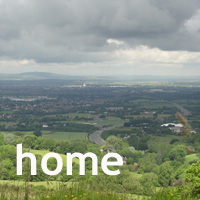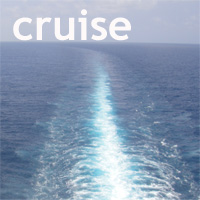Into Patagonia
 Wednesday, February 10, 2016 at 4:06PM
Wednesday, February 10, 2016 at 4:06PM
We woke to a misty scene outside, but kept our fingers crossed that, as the day warmed up, some of that mist would clear and we’d see some of the magnificent scenery.
Not much life here, apart from the occasional salmon farming enterprise.
Sometime in the late morning, the weather started to improve. We headed outside onto the top deck to take photographs but really to simply take in these amazing surroundings and enjoy the fresh, clear air. As we sailed further into the fjord, Terry Breen’s commentary pointed out the classic features of glacial landscapes – a geography teacher’s dream resource!
Hanging valley, anyone?
Even though we knew we were almost at our destination we still couldn’t see where that might be. There really was nowhere in sight.
But as we approached this split in the fjord, we began to turn the corner.
We came quite close to the side of the fjord too, seeing clearly why this is such an uninhabited area; one which Charles Darwin described as a green desert.
Sure enough, as we turned right, there was Puerto Chacabuco.
Look what was there already: Ocean Princess.
We quickly scooted downstairs to get our things and prepare for our adventure, described as “Full Day Patagonia Nature in Depth”. I took the opportunity to have a chat with the local guide who was already on board. She gave me a couple of maps and we chatted as I admired her hat – a kind of beret called a boina. It was actually rather reminiscent of a Basque beret of the same name, but this had gaucho heritage and a most important little tag which added a particular Patagonian flavour.
Soon, it was time to tender again.
The port of Chacabuco has been very carefully developed by a private company which owns and controls the nature reserve, an hotel and it seems, this whole operation.
We got an idea of the scale of this landscape once we were onshore. This “small” fjord turned out to be perfectly capable of accommodating two enormous ships both of which looked pretty tiny relative to their surroundings. Oh yes, this is big stuff.
Marta, our guide, gave us a bit of information about Puerto Chacabuco during the short drive to the nature reserve. There’s a general population of around 3000 people here, though some are seasonal residents. They are served by one school, one hospital, one church and one ATM. They enjoy 3000ml of rain a year and most are employed in either salmon farming or tourism.
It all felt very remote indeed.
We were divided into two smaller groups, ours being the “purple chucaos”. The chucao is a small, wren-like bird with a loud call. Marta said she fully expected us to see one or two along the way.
We warmed to her lively spirit and delightful accent! “Come on, purple chucaos!”
Into the rainforest we went.
Every so often, she’s stop and point out something of interest, including this huge gunnera-like plant. Local people use it to cook, sandwiching meat and vegetables between two of these enormous leaves for cooking - the leaves are discarded rather than eaten though. The stems are also used in a salad, so I guess it’s not gunnera…
There was a clear route through the forest and a couple of dry days meant that the pathway was easy to walk along.
Most of it was fairly densely planted, with an even mix of bamboos and other shrubby plants. Not so many tall trees here.
There was a small river, too, with bright, clear water.
Sadly, not so many flowers and not much variation in the planting, though I spotted some tiny blossoms on a bush by the river. Though some were lucky to see the little chucao bird, the fact that another couple of groups had gone this way only a short time before meant there was little to see beyond yet another species of bamboo or small shrub.
Thankfully there were, however, two stand-out stars of the forest for me and perhaps that’s enough? The first was this curiosity.
Known locally as “poor man’s wool”, this lichen-type plant isn’t attached to the ground at all but grows in small clumps. It’s quite soft and was used as an insulating layer as the name suggests. I imagine when it gets wet, it goes a bit soggy though!
About an hour and a half from the start of the walk, we came upon the waterfall, called the Old Man’s Beard.
Here, one of the other guides introduced me to my second star of the day. Hypoterygium arbusculans or the little umbrella moss. Why is it special? It’s the tallest moss in the world: all of 2 inches!
A short distance from the waterfall was the Quincho, a typical Chilean venue for barbeque and entertainment. The view over the lake was stunning and now the clouds had cleared, the air was fresh and clean.
Inside wasn’t quite so clear – the barbecue was set up in the middle with lambs roasting in the traditional style and the resultant smoke was lending a bit of atmosphere, shall we say?
The carving was rustic in style, but having enjoyed a pisco sour aperitif as we arrived and now, here at the table, freely flowing Cabernet Sauvignon, we were happy.
We were still more happy to see the view on our return to the port. By now, it was around 7.30pm and the changing light made it all the more interesting.
So, we hopped up top on the tender and sat on the roof for the return journey to Mariner.
Well, how could we resist the opportunity to sit up high in this wonderful place?
The little town of Puerto Chacabuco returned to its usual state of peace and quiet, until another ship, tomorrow, will bring some more lucky people.
For now, though, we just keep on taking photographs and feeling very thankful indeed to be here.
Our connection is so slow today, I’ve given up trying to include some links When it improves I’ll add a few
 Gill Thomas |
Gill Thomas |  1 Comment |
1 Comment |  Chile in
Chile in  cruise,
cruise,  fun,
fun,  travelling
travelling 








Reader Comments (1)
Gill, Waiting to hear about e-mailing pictures?
Your stuff is great.
Bill